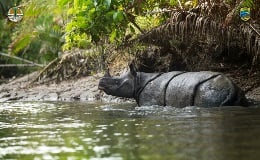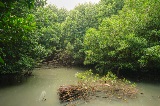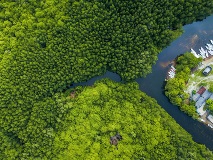Project Partner: Conservation International
Geographies: Singapore
What is the core idea of the pilot?
The International Blue Carbon Institute (IBCI), based in Singapore, was set up in 2022 to focus on accelerating and scaling the protection and restoration of blue carbon eco-systems globally. The IBCI will build capacity to meet increasing interest among governments in blue carbon as a climate action tool; drive understanding in the ocean and coastal eco-system's ability to mitigate and help communities adapt to climate change; and support Singapore's ambition to become a carbon services center, through leadership in blue carbon science. By enabling policy-makers to recognise and value coastal eco-systems for their carbon sequestration and climate adaptation potential, policy-makers can develop strategies that maximise climate action, enhance the well-being of communities, and the health of oceans.
Why is this innovative?
Integrating blue carbon into national strategies and working with governments will give conservation efforts better outcomes and long-term sustainability for the following reasons:
- Governance, legislation & enforcement: Formulate and enforce policies that influence land use, resource management and conservation efforts.
- Regulatory & incentive frameworks: Establish regulatory frameworks and incentives to facilitate the protection and restoration of blue carbon eco-systems.
- International agreements: Alignment of blue carbon policies to global goals, through country's obligations under international agreements & conventions
- Community engagement: Facilitate community involvement and civic participation in conservation projects, ensuring reflection of local voices & culturally appropriate policies.
- Data collection & monitoring: Access to local data to track the effectiveness of blue carbon projects over time.
- Stakeholder engagement and coordination: Coordinated efforts among ministries, departments, agencies, private sector & community groups, ensuring a cohesive approach.
What will success look like?
- Enable policy-makers to develop strategies that maximise climate action, enhance the well-being of communities, and the health of our oceans
- Realise long-term goal of mobilising government-to-government collaboration and unlocking essential financing, either through the compliance or voluntary markets, for nature conservation in the region
- Bring youth voices to the global stage in support of blue carbon and marine conservation, thereby generating greater pressure on policy-makers
How will success be achieved?
Key activities in the intervention include:
- Climate & blue carbon policy workshops: Workshops to enable policy-makers to understand the basics of carbon projects for climate mitigation and adaption. Content focuses on blue carbon ecosystems and identifying next steps to integrate ocean conservation into policy strategies.
- Climate Policy Fellowship: CI will partner with NUS CNCS to allow a dedicated expert to work with regional policy-makers to recognise carbon projects implemented by Cl in NDCs.
- Policy and Development: Engage key cross-sector stakeholders – governments, corporates, community and partner organisations – in the understanding of high-quality carbon projects and utilising guidance based on the latest science and research from the IBCI.
- Youth and community engagement: Leverage youth-led social media platforms to spread science-based content about blue carbon ecosystems. Bring together policy-makers, youth, corporates, communities and philanthropists to raise awareness around the importance of conserving and restoring blue carbon habitats for global climate goals.
Who is leading the project?
Since 1987, Conservation International has worked to protect and restore nature for the benefit of all, based on four key principles: protecting nature for climate, protecting land and seascapes that the world cannot replace if lost, safeguarding our oceans by doubling the size under protection, and reimagining conservation for all.







.tmb-.jpg?Culture=en&sfvrsn=9ab1f1f6_1)




